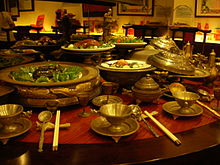Sep. 28th, 2013 08:05 pm
KodoGuru3 Ep12: Drama Notes
Final Ep. 12: "Sardine yukhoe and Nigiri-zushi at Ooimachi, Shinagawa Ward"

Episode Synopsis. For the final episode, Goro travels to Shinagawa Ward to meet with an owner of a cat cafe. Goro finds the owner quite gentle on cats but drives a hard bargain. Afterwards, he stops by a standing bar, hoping for some rice dishes but ends up ordering Chinese-style nibbles. Still yearning for rice, he decides to try out an eatery/pub, "Daruma-ya," specializing in sardine-based nibbles and dishes. Along with his usual oolong tea and his favorite rice, Goro sits down for a glorious fiesta of sardines - raw, boiled, grilled, and deep-fried...
(info and pic: tvtokyo)
Drama Notes:

Oimachi, Shinagawa Ward. Shinagawa Ward is made up of "natural uplands and lowlands, as well as reclaimed land." It used be a post town during the Edo Period, the first one that "a traveler would reach after setting out from Nihonbashi on the Tōkaidō highway from Edo to Kyoto." The Oimachi Station is served by Keihin-Tōhoku Line, Rinkai Line, and Ōimachi Line.
(info/pic: wiki)

Yukihoe. The "sardine yukihoe" in this episode was prepared ala "yukihoe" ("yukke" in Japanese) which is the Korean dish of raw ingredient (usually made from raw ground beef) seasoned with various spices or sauces, and served along with cut vegetables and often mixed with raw egg.




Episode Synopsis. For the final episode, Goro travels to Shinagawa Ward to meet with an owner of a cat cafe. Goro finds the owner quite gentle on cats but drives a hard bargain. Afterwards, he stops by a standing bar, hoping for some rice dishes but ends up ordering Chinese-style nibbles. Still yearning for rice, he decides to try out an eatery/pub, "Daruma-ya," specializing in sardine-based nibbles and dishes. Along with his usual oolong tea and his favorite rice, Goro sits down for a glorious fiesta of sardines - raw, boiled, grilled, and deep-fried...
(info and pic: tvtokyo)
Drama Notes:
 | ..... |  |
| Featured Eatery: Daruma-ya [だるまや] Address: 6-11-28 Minami-Shinagawa, Shinagawa Ward, Tokyo Tel. no. 03-3450-8858 Nearest Station: 1234m from Oimachi Station More pix and info: tabelog (map) | Featured Sweets Shop: Rourai-Tei [臚雷亭] Address: 5-4-15 Higashi-Oi, Shinagawa Ward, Tokyo Tel. no: 03-5461-8996 Nearest Station: 2-minute walk from Oimachi Station, JR Keihin-Tohoku Line More pix and info: tabelog (map) |

Oimachi, Shinagawa Ward. Shinagawa Ward is made up of "natural uplands and lowlands, as well as reclaimed land." It used be a post town during the Edo Period, the first one that "a traveler would reach after setting out from Nihonbashi on the Tōkaidō highway from Edo to Kyoto." The Oimachi Station is served by Keihin-Tōhoku Line, Rinkai Line, and Ōimachi Line.
(info/pic: wiki)

Yukihoe. The "sardine yukihoe" in this episode was prepared ala "yukihoe" ("yukke" in Japanese) which is the Korean dish of raw ingredient (usually made from raw ground beef) seasoned with various spices or sauces, and served along with cut vegetables and often mixed with raw egg.
(info/pic: wiki)

Century Egg. Acc. to wiki, "Chinese cuisine ingredient made by preserving duck, chicken or quail eggs in a mixture of clay, ash, salt, quicklime, and rice hulls for several weeks to several months, depending on the method of processing."

Kabayaki. Wiki says, "a preparation of the unagi eel, sometimes extended to other fish, where the fish is split down the back (or belly), gutted and boned, butterflied, cut into square fillets, skewered, dipped in a sweet soy sauce-base sauce before being broiled on a grill."

Manchu Han Imperial Feast. Said to be "one of the grandest meals ever documented in Chinese cuisine. It consisted of at least 108 unique dishes from the Manchu and Han Chinese culture during the Qing Dynasty, and it is only reserved and intended for the emperors."
Kanji for "Sardine". According to danburi, Goro mentions that the kanji for sardine is [ 鰯 ] with "fish" [ 魚 ] on the left and "weak" [ 弱 ] on the right. But as he's eating, he feels like it is [ 溺 ] or "drown" (as in he's "drowning" in a sea of sardines) so it's [ 氵] or "water" on the left and [ 弱 ] or "weak" on the right, like "weak against water therefore you drown".
(info: danburi)
Mop-up Pitcher. In baseball, a mop-up pitcher (or mop-up man), acc. to wiki, is "usually the bullpen's least effective reliever who comes in after the outcome of the game is all but certain.
Episode Index: (link)

love the show